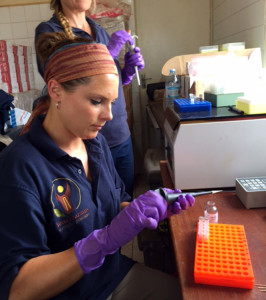Cultural understanding impacts disease control and education

By Sally Crocker
In a war-torn country where poverty, starvation, and limited access to health care offers bleak prospects, there is still a certain formality in the way life is lived and customs are observed.
That was the experience of Erin Carlson, DrPH, Assistant Professor in the School of Public Health, during a recent trip to Uganda – where she assisted with tuberculosis screening and prevention efforts.
As part of a Veterinarians Without Borders international outreach team, Dr. Carlson learned that following established social protocol is essential to working with government, schools and health officials.
“The culture in Uganda is very polite,” Dr. Carlson said. “As we traveled to schools offering TB education for students, we learned that there is an expected manner of introductions that should be observed prior to addressing business.”
Typically, Dr. Carlson said, a meeting would begin slowly, very mannerly, with a number of friendly questions.
“Good morning. How are you today? Did you sleep well last night? We would begin in that fashion after we were introduced by our driver and translator,” she said. “Interestingly, it was considered a real sign of respect to take the time to inquire about details such as how a person slept.”
Working with a retired teacher and a university administrator who were also volunteers, Dr. Carlson developed curriculum so that children could be taught healthy behaviors and then take the ideas home to their families.
“The goal is for children to become the generation that makes change for improved health conditions,” she said.
“In a country where the population is starving, it’s hard to say don’t eat from a sick animal, so we try to teach culturally relevant ideas like boiling milk, cooking meat thoroughly, signs to watch for, and what to do if an animal or person becomes ill,” Dr. Carlson said. “The education programs have to match how people live and the resources they have available.”
The collaboration between the School of Public Health, where Dr. Carlson teaches Health Management and Policy, and the Veterinarians Without Borders effort is designed to bring a public health perspective to international veterinary relief efforts, recognizing zoonotic diseases that can be spread between animals and humans, including TB, brucellosis and African sleeping sickness.




Social media